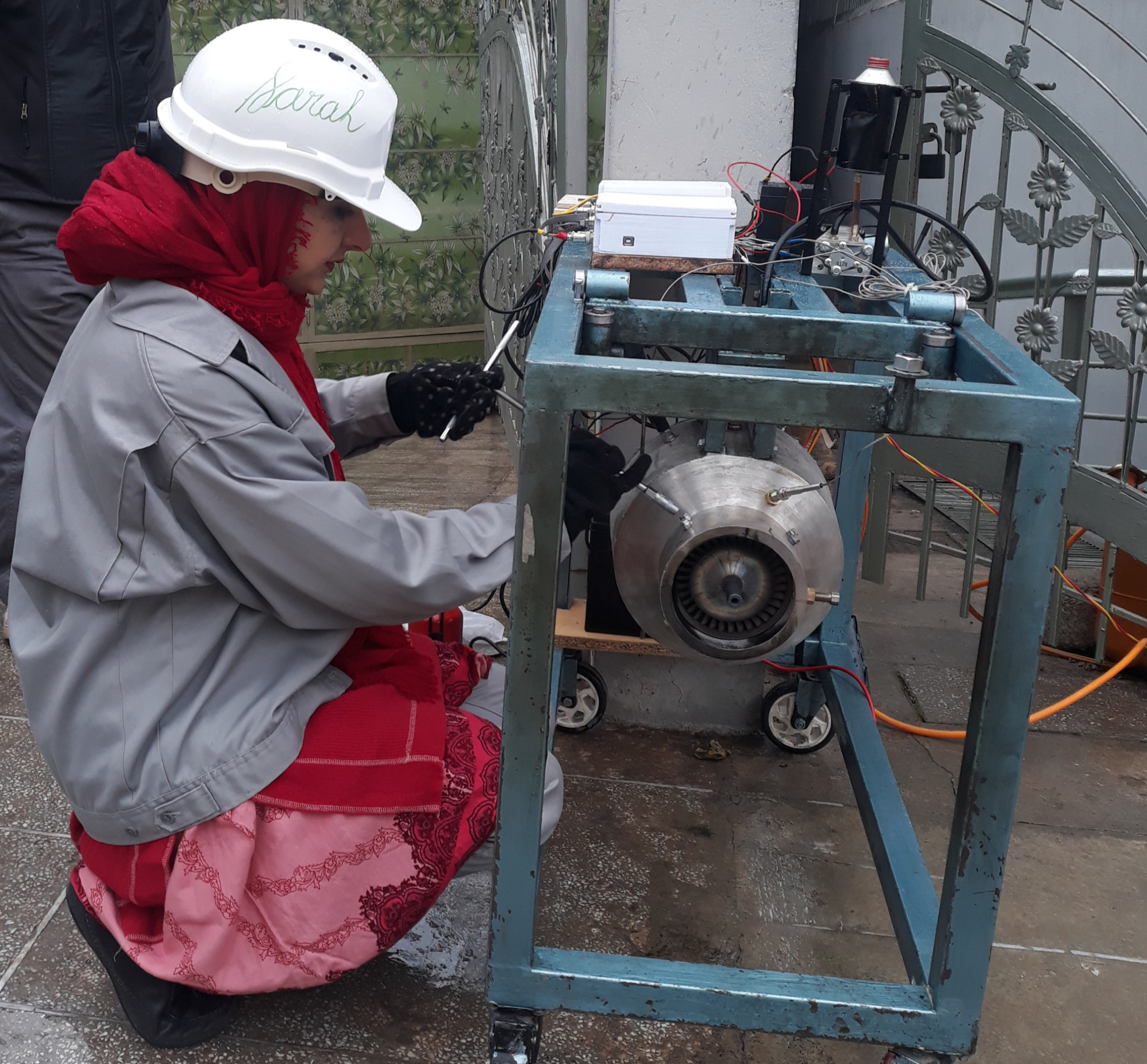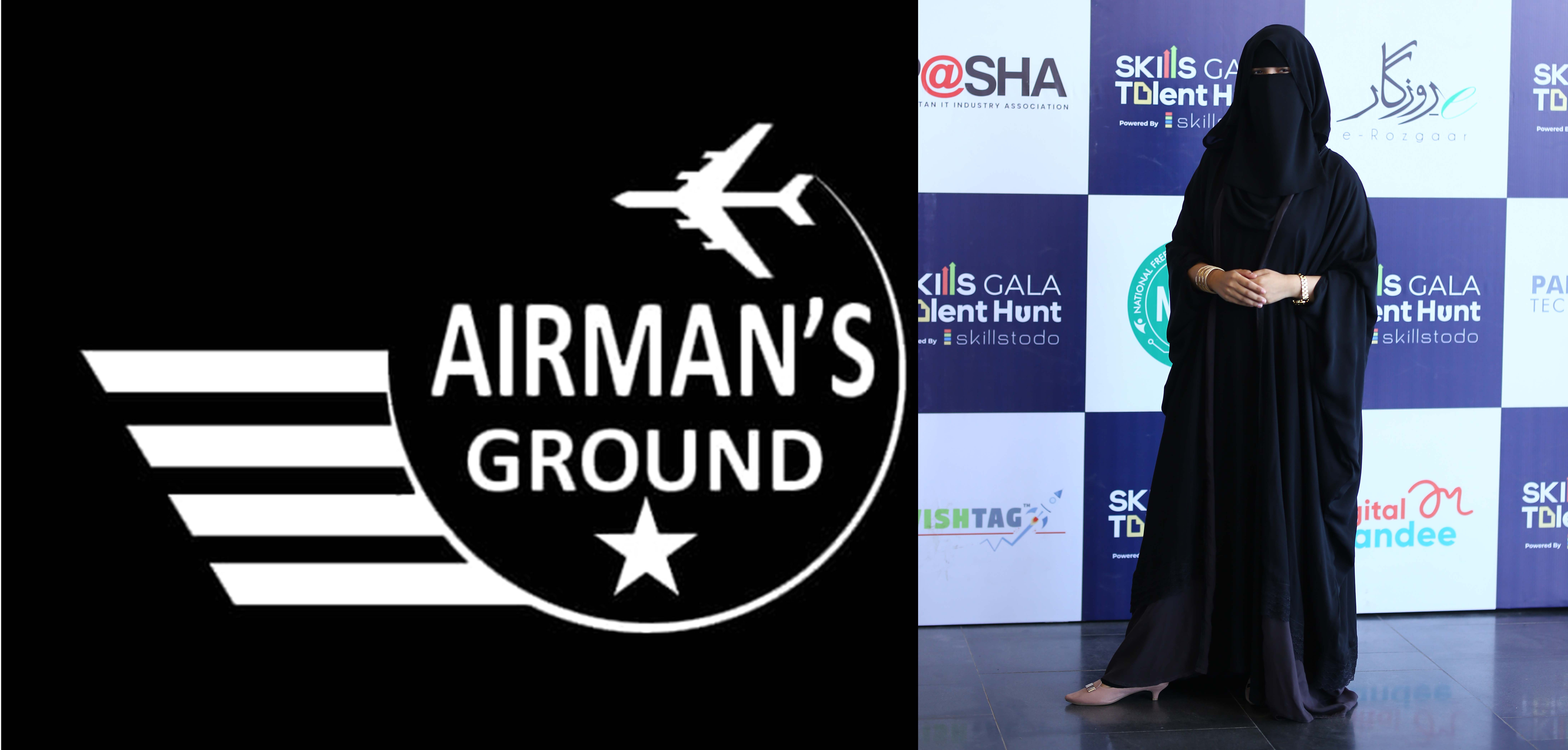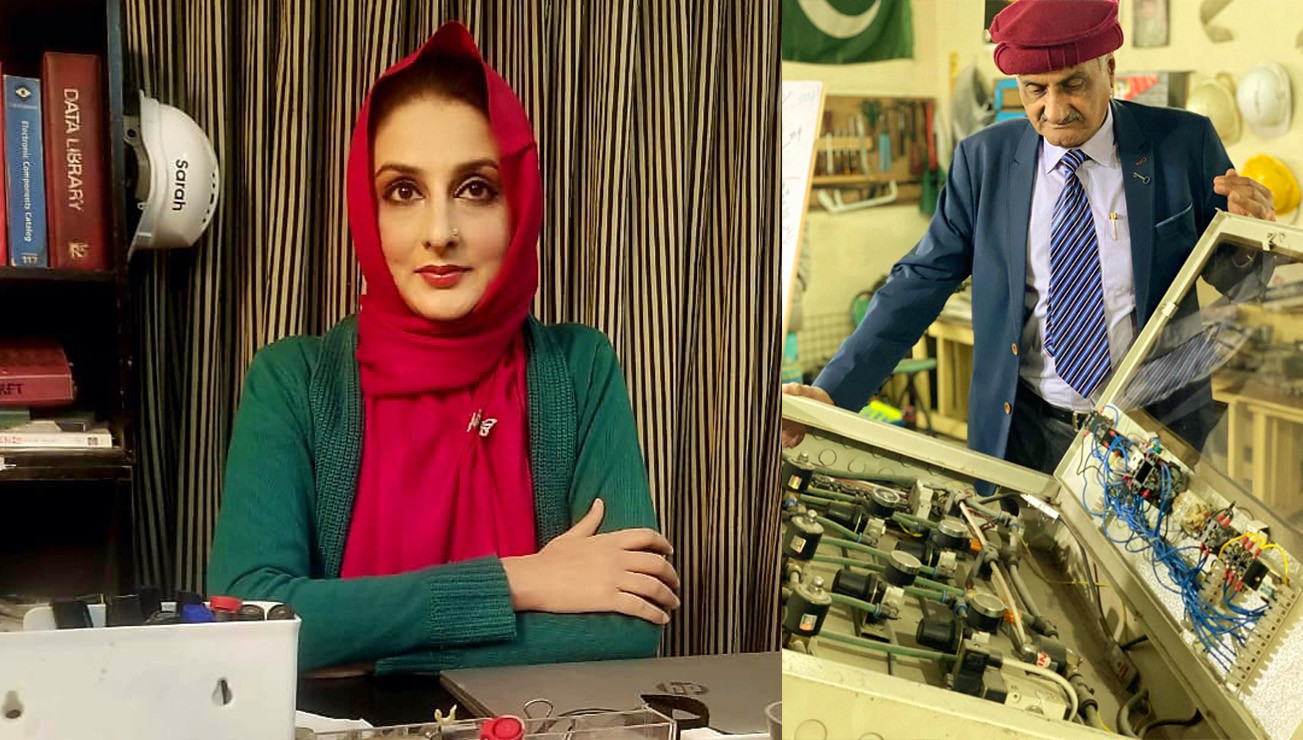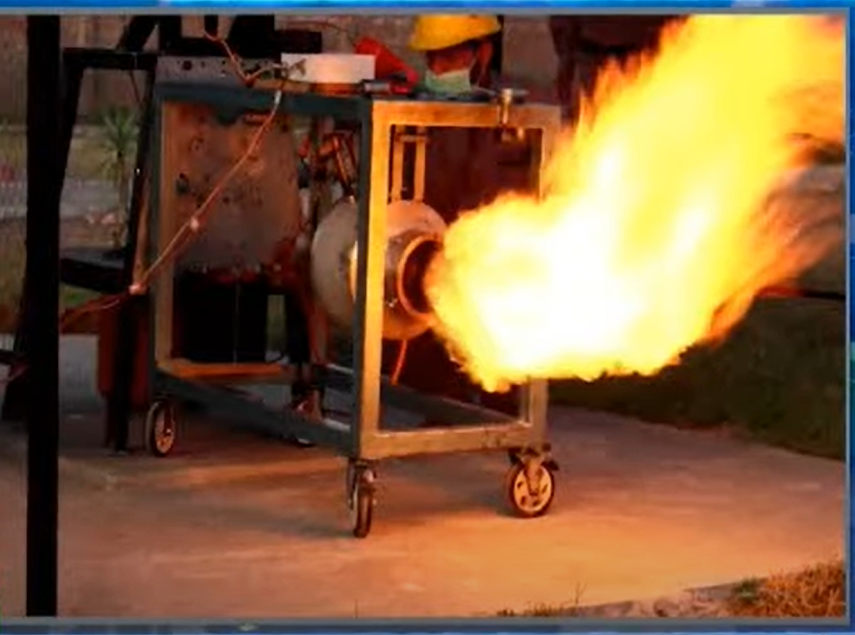THE SKY’S THE LIMIT: PAKISTANI INNOVATORS TAKE FLIGHT

Published by T-magazine
Pakistan’s skies have seen both turbulence and triumph. The nation’s aviation industry has long faced its share of challenges, from operational difficulties in Pakistan International Airlines (PIA) to the complex task of nurturing the next generation of pilots and aviation engineers. But amid the clouds of adversity, two startups have emerged as the rays of hope for a brighter aviation future.
While PIA navigates operational challenges, Airman’s Ground and Jet Engine Inventions stand as beacons of inspiration for those who share a deep passion for aviation. For those who dream of soaring through the skies as pilots or aspire to engineer the future of flight, these innovative ventures offer a new horizon of possibilities. They represent not only a shift in the way we approach aviation education and technology but also the dawn of a promising era in Pakistan’s aviation industry.
For those who look to the skies and envision themselves at the helm of an aircraft or playing a role in shaping the aviation technology of tomorrow, these startups, Airman’s Ground and ‘Jet Engine Inventions,’ are beacons of inspiration and opportunity. They signify a shift in the way we think about aviation education and technology in Pakistan and offer a glimpse of the transformational potential that lies within the nation’s aviation industry. The stories of these pioneering enterprises on how they are reshaping the landscape of aviation in Pakistan seems to be a way of hope for the aviation industry of Pakistan.

State of aviation in Pakistan
In the rapidly changing world of aviation, it’s essential to understand the context in which groundbreaking innovations are taking flight. Pakistan’s aviation industry, much like the global landscape, has encountered its fair share of challenges and opportunities, laying the groundwork for innovation that’s nothing short of transformative.
The aviation sector holds a vital place in Pakistan’s connectivity, trade, and technology infrastructure, shaping the nation’s progress and global engagement. But it’s a sector that has faced complexities—some of them exemplified by the operational challenges within PIA.
As we talk about the aviation landscape in Pakistan, it’s evident that the sector stands at a critical crossroads, poised between challenges and opportunities. Operational issues at PIA have sparked discussions about reforms and restructuring, underscoring the need for a fresh approach to revitalising the industry.
Amidst these challenges, two extraordinary startups have emerged as catalysts of change: Airman’s Ground and ‘Jet Engine Inventions.’ These visionary ventures are not only rewriting the playbook for aviation education and technology but are also redefining what’s possible within Pakistan’s aviation sector.
The story of these two trailblazing entities is emblematic of the resilience and innovative spirit that pulses through the aviation industry in Pakistan. In their responses to key questions, Captain Qadar Sarfraz and Dr. Sarah Qureshi, the founders of Airman’s Ground and ‘Jet Engine Inventions,’ respectively, offer insights that provide a clearer picture of the present and future of aviation in Pakistan.
As Captain Qadar reflects on the genesis of Airman’s Ground, she speaks of a vision to bridge a global gap in aviation education, where personalised, top-tier training can be accessed by aspiring pilots around the world. She recognised that a new approach to education was required, one that could transform aviation learning and democratise access to excellence. The result? Pakistan’s First Digital Aviation Academy, a beacon of innovation in aviation training that has set a precedent not just in Pakistan but on a global scale.
“Airman’s Ground was born out of a vision to bridge the gap in aviation education around the globe,” says Captain Qadar, the founder of Airman’s Ground. “As a pilot with over 13 years of experience, I recognised the need for accessible, high-quality individually customised aviation training. This led to the founding of Pakistan’s First Digital Aviation Academy and First of its kind in the world, offering students a digital platform to learn from the best around the world.”
On the other hand, Dr. Sarah’s journey with Jet Engine Inventions began with a broader mission—to develop eco-friendly aircraft engines for the global aviation industry. As she worked on this ambitious project with her father, Masood Latif Qureshi, they realised that Pakistan faced a technological gap in the field of jet engines. This realisation led to the birth of ‘Jet Engine Inventions,’ a company dedicated to filling this void. Their work not only promises to revolutionise drone technology but also has the potential to bring about a profound change in various industries, from agriculture to logistics and disaster relief.
“I started this work with my father Masood Latif Qureshi through another company Aero Engine Craft to develop eco-friendly aircraft engines for the global aviation industry,” explains Dr. Sarah. “Along the way we realised that there is a technological gap in the field of jet engines for Pakistan. Hence Jet Engine Inventions was founded to fill in this vacuum in the industry.”

Empowering future pilots
In the journey of aviation, aspiring pilots are the heartbeats of a dream. To become a pilot is to embark on a path less traveled, one that requires not only unwavering passion but also unparalleled guidance. In Pakistan, this journey has found a formidable ally in Airman’s Ground, a digital aviation academy that is rewriting the rules of pilot training.
While the aviation industry grapples with challenges, it is the next generation of pilots who will carry the torch forward, soaring into the future. Airman’s Ground is pioneering a transformative approach to pilot education that not only equips students with the skills they need but also empowers them with the flexibility to shape their own destinies.
Airman’s Ground has managed to achieve the seemingly impossible—a 100% passing rate. Their approach is unique, focusing on the individual needs of students, tailoring training to their budgets, and delivering one-on-one instruction. The result is a success rate that speaks volumes about the quality and effectiveness of this personalised approach.
“What sets Airman’s Ground apart is our commitment to personalised, one-on-one instruction,” says Captain Qadar, the founder of Airman’s Ground. “We tailor training to the individual needs and budgets of our students, ensuring they receive the attention and resources necessary to succeed. This personalised approach, combined with the expertise of our international instructors, contributes to our remarkable 100% passing rate.”
Time management, a significant challenge for pilot trainees, finds a solution in Airman’s Ground. The flexibility of personalised, one-on-one instruction means students can schedule classes at their convenience, ensuring that their training aligns with their unique timetables. This flexibility not only enhances learning but also eases the time constraints that aspiring pilots often face.
“Time management is indeed a challenge in pilot training,” Captain Qadar continues. “Our one-on-one instruction helps students manage their time effectively, as classes can be scheduled at their convenience. This personalised approach optimises the learning process and minimises the burden of self-learning and rigid schedules at flight schools.”
An international competitor, driven to excel in their PPL exam, reached out to this digital aviation academy and achieved remarkable results. Their consistent scores above 90% exemplify the quality of education offered at Airman’s Ground, so much so that a prominent aviation influencer chose to collaborate with them—a clear testament to the trust and confidence this academy has garnered in the aviation community.
“Each student at Airman’s Ground has a unique success story,” Captain Qadar smiles. “What makes this story even more remarkable is that this student is not just any aspiring pilot; they’re a prominent aviation influencer. After experiencing the quality of our education, this influencer chose to collaborate with us, a testament to the trust and confidence that Airman’s Ground has earned in the aviation community. This success story underlines the impact of our personalised approach and our commitment to preparing pilots for excellence.”
Captain Qadar shared the easy and approachable courses that can be designed to ones need, this is one of the reason that the success rate is too high. It offers innovation and flexibility meet to cater to the diverse needs and aspirations of aviation enthusiasts. It’s a testament to their commitment to revolutionising aviation education and empowering the future of aviation in Pakistan.
As Captain Qadar aptly puts it, “Airman’s Ground offers a wide range of courses, from Ab-initio to Private Pilot License (PPL), Commercial Pilot License (CPL), and Airline Transport Pilot License (ATPL) exams. Our courses are flexible, catering to both aspiring pilots and student pilots. We offer comprehensive resources, including live classes, study materials, and practice exams, all customised to suit the students’ specific needs and budgets.”
Talking about the demographics of their student pilots, Captain Qadar shared, “Our student base is diverse, we have students from around the world including Spain, Maldives, Kuwait, Saudi Arabia, Greece, England, Nigeria, U.S.A and Pakistan and with individuals from various age groups and backgrounds aspiring to become aviators. Common motivations include a passion to excel in aviation and to pass the ATPL exams in the first attempt to pace up their career aspirations, and a desire to achieve their dreams of flight.”
This diversity and shared passion among their students paint a vivid picture of the global appeal and universal aspirations that Airman’s Ground caters to, embodying the transformative potential of aviation education in Pakistan and beyond.
To bring their startup to this level, she highlighted the journey with Shell Tameer where she one of the finalist at the 10th Shell Tameer Awards. “Shell Tameer has been a valuable partner in our journey. They provided not only financial support but also mentorship and guidance, enabling us to expand and enhance our services. This support has played a pivotal role in advancing our startup and achieving our mission of transforming aviation education in Pakistan and around the world,” shared Captain Qadar.

Revolutionising urban air mobility
The tantalising promise of urban air mobility, with skies buzzing with drones that effortlessly transport goods and monitor our cities, is no longer confined to the realm of science fiction. Across the globe, the drone industry is rapidly gaining altitude, with applications spanning from surveillance and agriculture to aerial photography and logistics. In Pakistan, these unmanned aerial vehicles are poised to revolutionise industries, but there’s a crucial technological gap that’s been impeding progress. That’s where Dr. Sarah and Jet Engine Inventions come into play.
“I started this work with my father Masood Latif Qureshi through another company Aero Engine Craft to develop eco-friendly aircraft engines for the global aviation industry,” shares Dr. Sarah, the visionary founder of ‘Jet Engine Inventions.’ “Along the way we realised that there is a technological gap in the field of jet engines for Pakistan. Hence Jet Engine Inventions was founded to fill in this vacuum in the industry.”
The mission of Jet Engine Inventions is nothing short of transforming Pakistan into a hub of advanced jet engine development. Their goal is to establish a facility for the mass production of high-tech jet engines, bridging a critical technological gap that has held back the nation’s progress in drone technology. “We want to make a breakthrough in this technology by setting up a jet engine mass production and manufacturing facility in the country,” shared Dr Sarah. The implications of this mission are profound, for it has the power to usher in a new era of innovation and application in the drone industry.
The challenges faced by Pakistan in drone technology are indeed substantial. Power constraints, due to the lack of access to jet engines, have confined drones to small batteries, restricting their payload capacity and endurance. The consequences have been significant, curbing the full potential of drones in various applications.
“Drone applications are gaining strength in Pakistan with reference to surveillance, agriculture, aerial photography, and logistics, and delivery,” Dr. Sarah continues. “However, due to a lack of local expertise in propulsion and an embargo on the import of jet engines, we are restricted to small batteries as power plants for drone flight. This limits the payload capacity and endurance of drones and hence restricts the applications that they can be used for.”
The innovative jet engine technology developed by Jet Engine Inventions has the power to redefine the scope of drones in Pakistan. By overcoming power constraints, it can unlock the potential for drones to carry heavy payloads, cover vast agricultural lands for precision spraying, and revolutionise logistics and disaster relief efforts. It represents a giant leap forward in enhancing the efficiency and productivity of drone applications, making them a valuable asset for various industries.
“It is not possible to fly them across the country with heavy payloads or even to cover vast agricultural land for spraying if they are powered by batteries,” Dr. Sarah emphasises. “The jet engine our company developed has the capability to overcome these problems and enhance the efficiency and productivity of drone usage in Pakistan. A jet engine-powered drone will open doors to several other utilisations of drones and can bring a revolution in mechanising the vast agriculture and industrial sector of Pakistan. A jet engine-powered large-scale drone has great application in logistics and delivery to flood-stricken areas, rescue and search operations during natural calamities as well as inaccessible remote areas in the north of Pakistan.
Becoming a part of the league of nations that produce jet engines is a formidable goal for Pakistan. Jet engine research, development, and manufacturing represent a high-precision, advanced technology that not only adds substantial value but also fosters economic strength while reducing import costs and dependencies. The support of Shell Tameer plays a pivotal role in enabling Jet Engine Inventions to achieve this monumental goal.
“There are very few countries in the world that make jet engines because it’s a very advanced tech-intensive high-precision technology,” Dr. Sarah underscores. “We want Pakistan to stand in that league of countries. Jet engine research, development, and manufacturing offer great value addition and economic strength and reduce import costs and dependency. Given the financial support that we require through Shell Tameer, we have the capacity to do this for Pakistan.”

The journey of Jet Engine Inventions was inspired by a quest to develop eco-friendly aircraft engines for the global aviation industry. Yet, along the way, Dr. Sarah and her team recognised a significant technological gap within Pakistan. This realisation led to the founding of ‘Jet Engine Inventions,’ a pioneering endeavor that’s set to bridge this gap and catalyze a new era of drone technology in the nation.
“I started this work with my father Masood Latif Qureshi through another company Aero Engine Craft to develop eco-friendly aircraft engines for the global aviation industry,” Dr. Sarah recalls. “Along the way, we realised that there is a technological gap in the field of jet engines for Pakistan. Hence Jet Engine Inventions was founded to fill in this vacuum in the industry.”
The journey towards realising their innovative jet engine technology is well underway. The ground testing of their developed jet engine for drone applications is already in progress, with a focus on research and development. “We are ground testing the jet engine that we have developed for drone applications at present on our R & D prototype,” Dr. Sarah explains.
Dr. Sarah’s startup was nominated as the finalists in the recently held Shell Tameer Award. For Dr Sarah, this has played a crucial role in this journey, empowering Jet Engine Inventions to develop a pre-production prototype of their jet engine, optimised for drones.
“With the Shell Tameer Award, we wish to develop the pre-production prototype of the jet engine, customise it for an optimum drone sise, conduct flight tests for several parameters as well as collect data over several flight missions. This shall enable us to freeze the design and manufacturing process of the final prototype that can be offered for sale to drone manufacturers in Pakistan.”
In the realm of drone technology, Pakistan is on the cusp of a transformation, led by Jet Engine Inventions and their mission to redefine urban air mobility through cutting-edge jet engines. Their groundbreaking endeavor has the potential to revolutionise industries and open new horizons for drone applications, transforming Pakistan’s technological landscape in the process.
Shaping the future
The stories of Airman’s Ground and Jet Engine Inventions stand as remarkable testimonies to the unwavering spirit of innovation and progress within Pakistan’s aviation industry. These two pioneering startups, led by Captain Qadar and Dr. Sarah, are not only reshaping the present but also charting the course for a promising future of aviation in Pakistan.
As the future of pilot training in Pakistan takes shape, Airman’s Ground stands at the forefront of this evolution. Their commitment to accessible, technology-driven, and customised learning paves the way for a new era in aviation education. Their vision extends beyond their remarkable success rates to a future where aspiring pilots have every opportunity to achieve their dreams, enabled by innovative, personalised instruction.
“We see the future of pilot training evolving towards more accessible, technology-driven, and customised learning,” Captain Qadar shares. “Airman’s Ground aims to lead this evolution by continuously improving our offerings, expanding our global reach, and collaborating with institutions to enhance aviation education.”
On the other front, Dr. Sarah is on a mission to bridge a significant technological gap in Pakistan’s drone industry. Their groundbreaking jet engine technology has the power to revolutionise drone applications in the country, unlocking new possibilities for surveillance, agriculture, logistics, and disaster relief. By overcoming power constraints, Jet Engine Inventions aims to make Pakistan a hub for advanced jet engine development, reducing import costs, and fostering economic strength. Their journey, inspired by the quest for eco-friendly aircraft engines, has taken a turn towards reshaping urban air mobility in Pakistan.
These visionary ventures have not only addressed pressing challenges within Pakistan’s aviation landscape but have also opened doors to unprecedented opportunities. By fostering innovation, education, and technology, they are playing a pivotal role in transforming the aviation sector in the country. With their resilience, determination, and pioneering spirit, they have become beacons of hope for the aviation industry in Pakistan.
Their endeavors are shaping the future of aviation in Pakistan, steering it towards greater heights and new horizons. With their unwavering commitment to progress and excellence, these startups are propelling Pakistan’s aviation industry into a promising era of growth, innovation, and global engagement. The skies above Pakistan are witnessing a transformation, and these two startups are the guiding stars leading the way.





